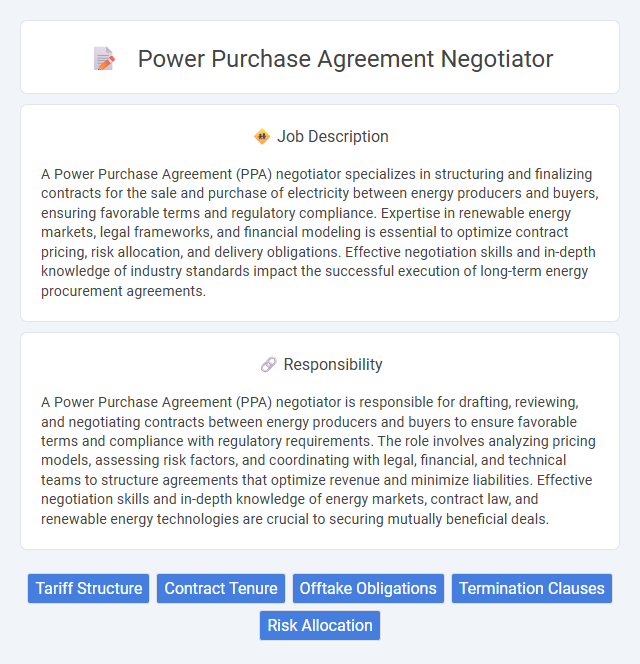
A Power Purchase Agreement (PPA) negotiator specializes in structuring and finalizing contracts for the sale and purchase of electricity between energy producers and buyers, ensuring favorable terms and regulatory compliance. Expertise in renewable energy markets, legal frameworks, and financial modeling is essential to optimize contract pricing, risk allocation, and delivery obligations. Effective negotiation skills and in-depth knowledge of industry standards impact the successful execution of long-term energy procurement agreements.
Individuals with strong analytical skills and a keen understanding of contract law are likely to find success as Power Purchase Agreement (PPA) negotiators. Those comfortable with high-stakes negotiations and capable of managing complex stakeholder relationships may be more suitable for this role. People who thrive in dynamic energy markets and can adapt to evolving regulatory environments probably have a better chance of excelling in this position.
Qualification
A Power Purchase Agreement (PPA) negotiator must possess strong expertise in energy markets, contract law, and regulatory frameworks to effectively secure favorable terms for electricity purchasing contracts. Proficiency in financial modeling, risk assessment, and stakeholder communication is essential to analyze project viability and negotiate terms that maximize profitability and minimize risk. A background in engineering, law, or finance, combined with experience in renewable energy projects and negotiation tactics, significantly enhances a candidate's qualifications for this role.
Responsibility
A Power Purchase Agreement (PPA) negotiator is responsible for drafting, reviewing, and negotiating contracts between energy producers and buyers to ensure favorable terms and compliance with regulatory requirements. The role involves analyzing pricing models, assessing risk factors, and coordinating with legal, financial, and technical teams to structure agreements that optimize revenue and minimize liabilities. Effective negotiation skills and in-depth knowledge of energy markets, contract law, and renewable energy technologies are crucial to securing mutually beneficial deals.
Benefit
A Power Purchase Agreement negotiator is likely to benefit from high demand for expertise in renewable energy contracts, resulting in competitive salaries and job security. Their skill set may enable them to influence cost-effective energy procurement, enhancing the financial performance of their organization. Opportunities for professional growth and involvement in sustainable energy projects could further increase the value of this role.
Challenge
Power purchase agreement negotiators likely face significant challenges in balancing the interests of energy producers and buyers while ensuring regulatory compliance. The complexity of contract terms, market volatility, and evolving renewable energy policies probably increase the difficulty of securing favorable agreements. Negotiators must anticipate potential risks and ambiguities, requiring sharp analytical skills and strategic foresight to mitigate disputes and optimize contract outcomes.
Career Advancement
Power purchase agreement (PPA) negotiators develop expertise in contract law, energy markets, and risk management, positioning themselves for senior roles such as energy contracts manager or director of procurement. Mastery in negotiating complex PPA terms directly contributes to strategic decision-making in renewable energy projects, enhancing career opportunities in sustainable energy firms and utilities. Continuous skill development in regulatory compliance and financial modeling significantly accelerates the trajectory toward executive leadership in the energy sector.
Key Terms
Tariff Structure
A Power Purchase Agreement (PPA) negotiator specializes in structuring tariff frameworks that balance cost-effectiveness and long-term profitability for energy providers. Expertise in tariff structures such as fixed rates, variable rates, and time-of-use pricing is crucial to optimize revenue streams and mitigate risks associated with market fluctuations. Mastery in aligning tariff models with regulatory requirements and renewable energy incentives enhances contract viability and investor confidence.
Contract Tenure
Power purchase agreement negotiators focus on defining contract tenure to balance long-term energy supply stability with financial and operational flexibility for both producers and purchasers. Optimal contract duration typically ranges from 10 to 25 years, ensuring predictability in cash flows and maintenance obligations. Negotiators carefully assess market conditions, regulatory frameworks, and project lifecycle to determine tenure favorable for risk allocation and investment security.
Offtake Obligations
Power Purchase Agreement (PPA) negotiators specialize in structuring and finalizing terms related to offtake obligations, ensuring that buyers commit to purchasing predetermined energy quantities under specified conditions. They analyze demand forecasts, regulatory frameworks, and risk allocations to optimize contract enforceability and financial stability for all parties. Expertise in assessing termination clauses, force majeure provisions, and pricing mechanisms is crucial to secure long-term revenue certainty in renewable energy markets.
Termination Clauses
A Power Purchase Agreement (PPA) negotiator specializes in drafting and revising Termination Clauses to protect stakeholders from unforeseen contractual breaches or regulatory changes. These clauses define conditions under which the agreement may be ended, including force majeure events, failure to meet delivery obligations, or financial insolvency, ensuring risk mitigation and clear exit strategies. Skilled negotiators tailor termination terms to balance legal protections with operational flexibility for renewable energy projects.
Risk Allocation
A Power Purchase Agreement (PPA) negotiator specializes in defining and balancing risk allocation between energy producers and purchasers to ensure contractual stability and financial viability. Key risks addressed include price volatility, project performance, regulatory changes, and force majeure events, with negotiators structuring clauses to mitigate liability and allocate responsibilities clearly. Effective risk allocation in PPAs enhances investor confidence and supports sustainable energy project development by minimizing potential disputes and financial uncertainties.
 kuljobs.com
kuljobs.com